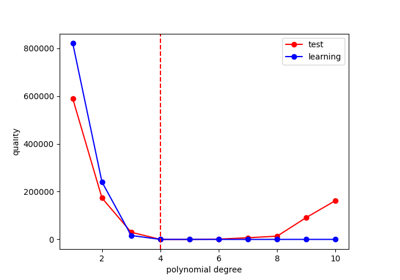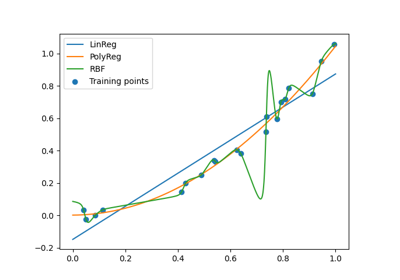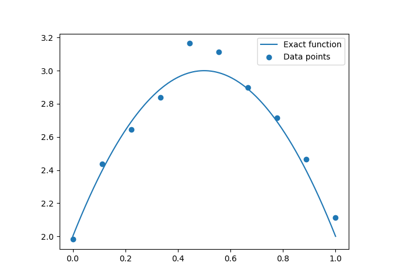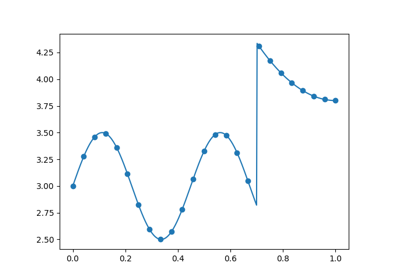quality_measure module¶
Measuring the quality of a machine learning algorithm.
- class gemseo.mlearning.quality_measures.quality_measure.MLQualityMeasure(algo, fit_transformers=True)[source]
Bases:
objectAn abstract quality measure to assess a machine learning algorithm.
This measure can be minimized (e.g.
MSEMeasure) or maximized (e.g.R2Measure).It can be evaluated from the learning dataset, from a test dataset or using resampling techniques such as boostrap, cross-validation or leave-one-out.
The machine learning algorithm is usually trained. If not but required by the evaluation technique, the quality measure will train it.
Lastly, the transformers of the algorithm fitted from the learning dataset can be used as is by the resampling methods or re-fitted for each algorithm trained on a subset of the learning dataset.
- Parameters:
- class EvaluationMethod(value)[source]
Bases:
StrEnumThe evaluation method.
- BOOTSTRAP = 'BOOTSTRAP'
The name of the method to evaluate the measure by bootstrap.
- KFOLDS = 'KFOLDS'
The name of the method to evaluate the measure by cross-validation.
- LEARN = 'LEARN'
The name of the method to evaluate the measure on the learning dataset.
- LOO = 'LOO'
The name of the method to evaluate the measure by leave-one-out.
- TEST = 'TEST'
The name of the method to evaluate the measure on a test dataset.
- abstract evaluate_bootstrap(n_replicates=100, samples=None, multioutput=True, seed=None)[source]
Evaluate the quality measure using the bootstrap technique.
- Parameters:
n_replicates (int) –
The number of bootstrap replicates.
By default it is set to 100.
samples (Sequence[int] | None) – The indices of the learning samples. If
None, use the whole learning dataset.multioutput (bool) –
If
True, return the quality measure for each output component. Otherwise, average these measures.By default it is set to True.
seed (int | None) – The seed of the pseudo-random number generator. If
None, then an unpredictable generator will be used.
- Returns:
The value of the quality measure.
- Return type:
MeasureType
- abstract evaluate_kfolds(n_folds=5, samples=None, multioutput=True, randomize=True, seed=None)[source]
Evaluate the quality measure using the k-folds technique.
- Parameters:
n_folds (int) –
The number of folds.
By default it is set to 5.
samples (Sequence[int] | None) – The indices of the learning samples. If
None, use the whole learning dataset.multioutput (bool) –
If
True, return the quality measure for each output component. Otherwise, average these measures.By default it is set to True.
randomize (bool) –
Whether to shuffle the samples before dividing them in folds.
By default it is set to True.
seed (int | None) – The seed of the pseudo-random number generator. If
None, then an unpredictable generator will be used.
- Returns:
The value of the quality measure.
- Return type:
MeasureType
- abstract evaluate_learn(samples=None, multioutput=True)[source]
Evaluate the quality measure from the learning dataset.
- Parameters:
- Returns:
The value of the quality measure.
- Return type:
MeasureType
- evaluate_loo(samples=None, multioutput=True)[source]
Evaluate the quality measure using the leave-one-out technique.
- Parameters:
- Returns:
The value of the quality measure.
- Return type:
MeasureType
- abstract evaluate_test(test_data, samples=None, multioutput=True)[source]
Evaluate the quality measure using a test dataset.
- Parameters:
- Returns:
The value of the quality measure.
- Return type:
MeasureType
- classmethod is_better(val1, val2)[source]
Compare the quality between two values.
This method returns
Trueif the first one is better than the second one.For most measures, a smaller value is “better” than a larger one (MSE etc.). But for some, like an R2-measure, higher values are better than smaller ones. This comparison method correctly handles this, regardless of the type of measure.
- algo: MLAlgo
The machine learning algorithm usually trained.
- class gemseo.mlearning.quality_measures.quality_measure.MLQualityMeasureFactory[source]
Bases:
BaseFactoryA factory of
MLQualityMeasure.- Return type:





